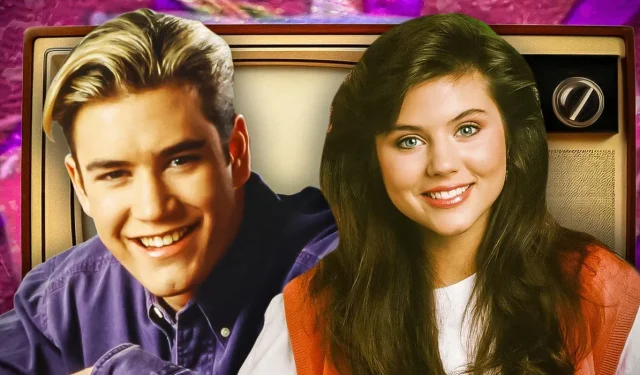
Saved By the Bell, a quintessential television series from 1989 to 1992, has left an indelible mark on generations of viewers, particularly among Generation X and Millennials. The show’s signature ’90s aesthetics—complete with eye-catching fashion, catchy music, and a generous amount of hairspray—continues to evoke nostalgia even today. Distinguished for its groundbreaking approach, it showcased a diverse group of vibrant teenagers and directly connected with its audience, making it a staple of teen television.
The main characters—including Zack Morris (Mark-Paul Gosselaar), Screech Powers (Dustin Diamond), Lisa Turtle (Lark Voorhies), and Mr. Belding (Dennis Haskins)—first appeared in the precursor series, Good Morning, Miss Bliss. After a revamp, they became part of the ensemble we know and love in Saved By the Bell. With the addition of Kelly Kapowski (Tiffani Amber Thiessen), Jessie Spano (Elizabeth Berkley), and A.C. Slater (Mario Lopez), the series struck gold and became a cultural phenomenon. Yet, it’s important to acknowledge that some themes in the series have not aged well and reflect the societal norms of their time, presenting challenges for modern viewers.
10. The “Rent-a-Pop”Episode
From Season 2
This episode centers around Zack’s scheme to attend a school carnival despite failing his classes. He hires an actor to impersonate his father, a storyline that seems absurd by today’s standards. The contemporary environment demands rigorous background checks for anyone involved in a child’s education, and the thought of an adult posing as a parent to gain school access is unthinkable. In light of today’s heightened security and social awareness, this plot would simply not be feasible.
9. The “Jessie’s Song”Episode
From Season 2
In one of the show’s most unforgettable episodes, “Jessie’s Song,”viewers see the pressures of academic life push Jessie to take caffeine pills to manage her workload. The episode attempts to address substance abuse, but the portrayal feels misguided, especially since caffeine pills lack the seriousness of more potent drugs. Given the cultural context of the ’90s “Just Say No”campaign, it falls short in delivering a credible message on drug addiction.
8. Screech’s Obsession with Lisa
From Seasons 1-4
Screech’s unrequited love for Lisa Turtle represents a recurring theme of teen infatuation, but it often veers into problematic territory. Despite Lisa’s consistent rejection, Screech is encouraged to persist, which has troubling implications in the context of respect and consent. While intended for comedic effect, the overarching narrative raises ethical questions regarding the encouragement of such behaviors among friends.
7. Zack Telling Everyone Slater Was Dying
From Season 1
In an attempt to eliminate Slater as a rival for Kelly’s affection, Zack concocts a ludicrous lie about having a terminal illness. This portrayal trivializes serious matters like illness, reflecting a cultural insensitivity that would be unacceptable in today’s television landscape. Even then, laughing at such a dark subject raises ethical concerns regarding the treatment of serious topics in a lighthearted setting.
6. Kelly Dating Jeff
From Season 2
The age disparity between Kelly and her college-age boyfriend Jeff raises eyebrows, particularly as their relationship is presented without scrutiny. In today’s context, this dynamic would provoke serious discussions surrounding power imbalances in relationships, especially those involving adults and minors.
5. The Lisa Card Episode
From Season 1
Lisa’s shopping addiction leads Zack to auction off a kiss from her—without her consent—a plot that brings up important conversations about personal boundaries and consent in friendships. Such acts risk trivializing respect in relationships and eliciting discomfort in contemporary audiences.
4. The Zack Tapes Episode
From Season 1
Zack’s use of subliminal messaging to manipulate his peers into dating him illustrates an alarming narrative about coercion and consent. Such tactics, while portrayed humorously, would inspire strong condemnation in today’s more aware landscape, emphasizing the need for accountability.
3. The Tori Situation
From Season 4
In its final season, a last-minute character shift introduces Tori Scott (Leanna Creel) in the absence of Jessie and Kelly, with no explanation for their absence or eventual return. This abrupt narrative choice contrasts sharply with modern television storytelling standards, which typically prioritize continuity and clear character arcs.
2. The “Running Zack”Episode
From Season 2
This infamous episode where Zack discovers his Native American heritage devolves into cultural insensitivity and stereotyping. The portrayal raises significant concerns about cultural appropriation—an issue that remains highly relevant in contemporary discussions about representation and respect in media.
1. The Girls of Bayside Calendar
From Season 2
The episode “Model Students”raises alarm due to its portrayal of Zack and Screech objectifying their peers by photographing the girls’ swim team without consent. This scenario not only illustrates blatant disrespect but also flouts legal boundaries regarding privacy. The subsequent exploitation of these images highlights critical issues around consent and respect that, when viewed today, appear shockingly out of touch.
Leave a Reply